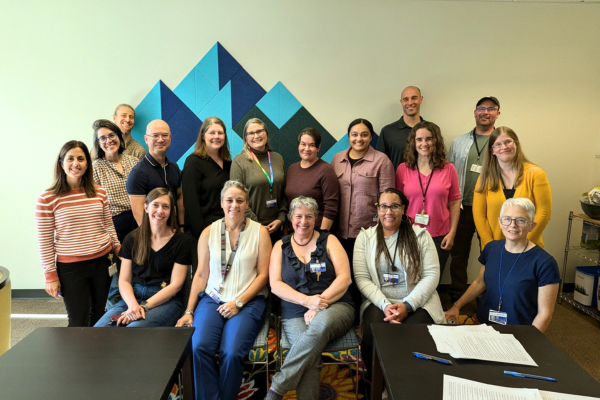CORE new project spotlight: improving cancer screening access, incentivizing interpretive services, healthy birth, and more!
The Providence Center for Outcomes Research & Education (CORE) is pleased to announce four exciting and impactful projects that build on our past work around access to cancer screenings, language access in healthcare, and more. Read on to learn about these projects and their potential impacts on healthcare access and health equity.
Can a low-barrier screening program reduce disparities and improve colorectal cancer outcomes?
Barriers to colonoscopy, including affordability, accessibility, and acceptability, prevent many individuals from receiving their recommended CRC screenings. With funding from The Patrick and Catherine Weldon Donaghue Medical Research Foundation, CORE will investigate a low-barrier colorectal cancer (CRC) screening program at Providence that uses fecal immunochemical testing (FIT) kits to increase access to screening. FIT kits have become an increasingly used low-barrier option for CRC screening. However, for the full value of FIT screening to be realized, FITs must be completed annually, and patients whose screens are positive need follow-up care. This study will explore equity, persistency, and follow-up for FIT screening to improve and reduce disparities, not only with respect to CRC screenings but also CRC outcomes.
Investigating financial incentives’ impacts on the provision of interpretive services in Medicaid
Federal law has long required access to interpretive services within healthcare settings. In an effort to improve language access within the healthcare system, Oregon has taken the innovative approach of incentivizing health systems to provide these services. CORE is working with the Oregon Health Authority to evaluate the extent to which these financial incentives can help increase access to interpretive services for Medicaid members. The study is funded by the Agency for Healthcare Research and Quality (AHRQ).
Evaluating a community and health system partnership’s impact on Black birth outcomes
In collaboration with Portland State University researcher Dr. Roberta Hunte, CORE is examining the impacts of a partnership between Providence and the Healthy Birth Initiative (HBI) on Black birth outcomes. Providence partners with HBI, a community-based program run by Multnomah County, to help improve policies, practices, and outcomes for Black birthing people. In 2023, CORE helped analyze Dr. Hunte’s interviews of staff at both organizations to examine these relationship-building efforts. In 2024, with funding from the William E. & Thelma F. Housman Foundation for Medical Research, we are excited to expand the study by interviewing patients to explore the partnership’s impacts on their birth experiences and outcomes.
Studying how different outreach methods and workflows support participation in genetic testing
The CORE team will continue our research on access to genetic testing with the support of a two-year grant from the Merck Investigator Studies Program. This project focuses on a Providence program that screens people receiving mammograms to determine if they are at high risk of cancer and should get genetic testing. Despite the potential benefits, 90 percent of patients identified as high risk do not continue on to get genetic testing. CORE will work with the Providence Genomics team to study the impact of recruitment methods and workflows on patient engagement with testing and examine how those approaches do or do not support equitable access. The goal is to inform program design to ensure equitable access as the program expands.
For more information about these or other CORE projects, get in touch!




